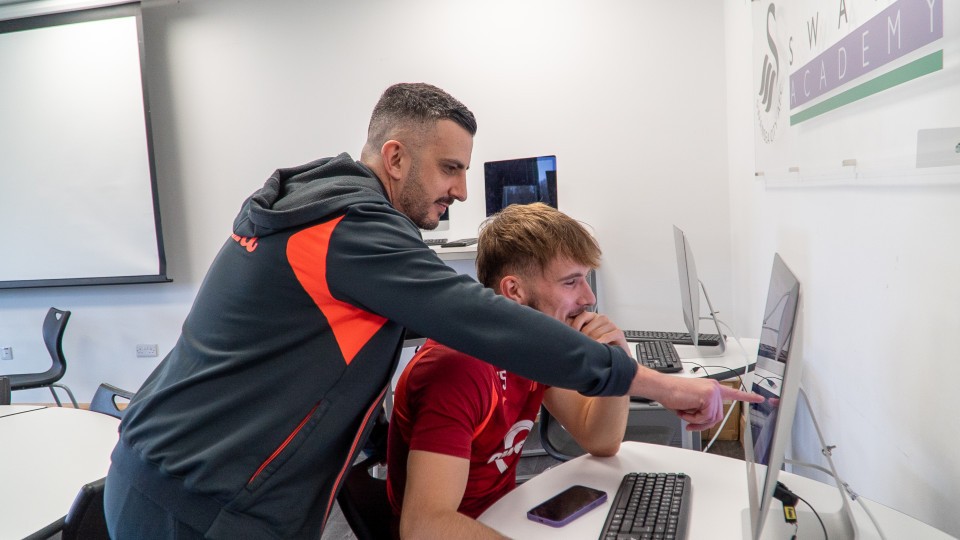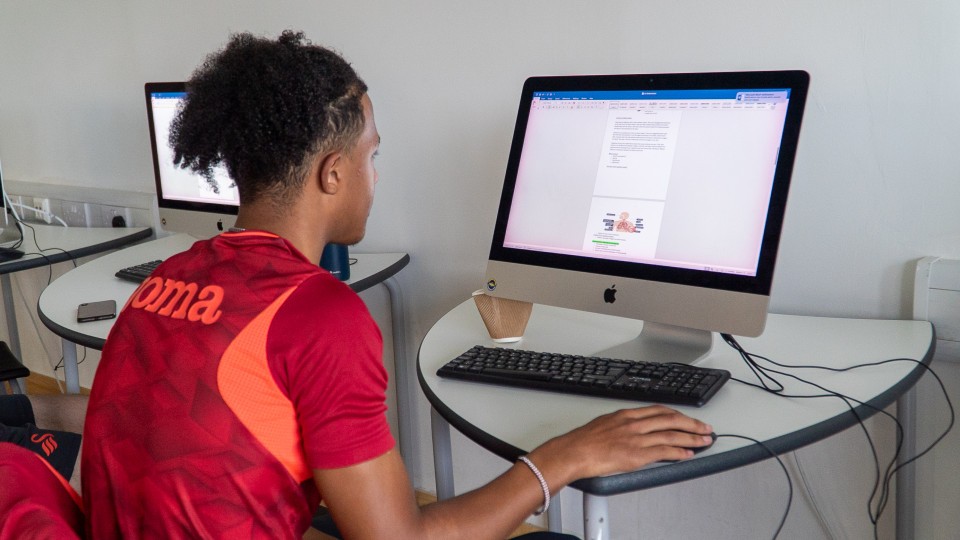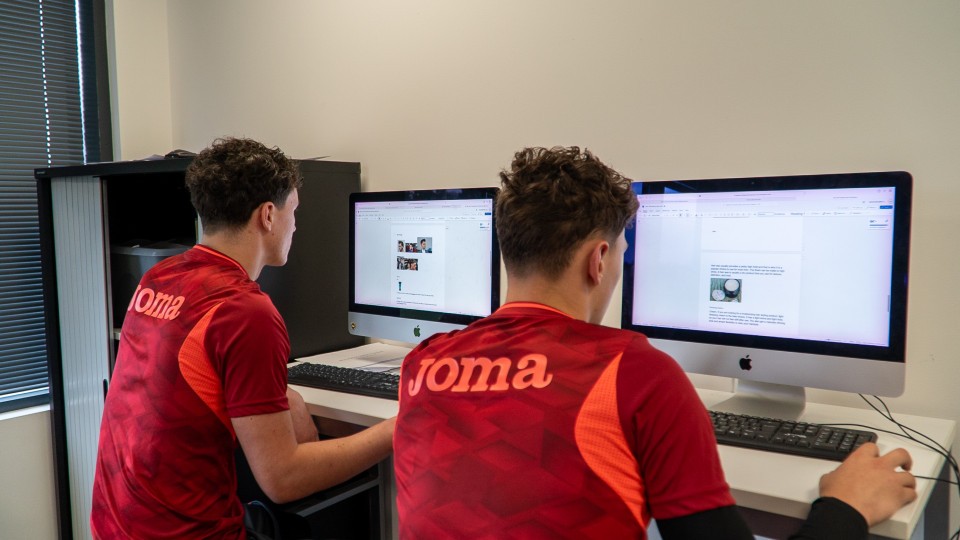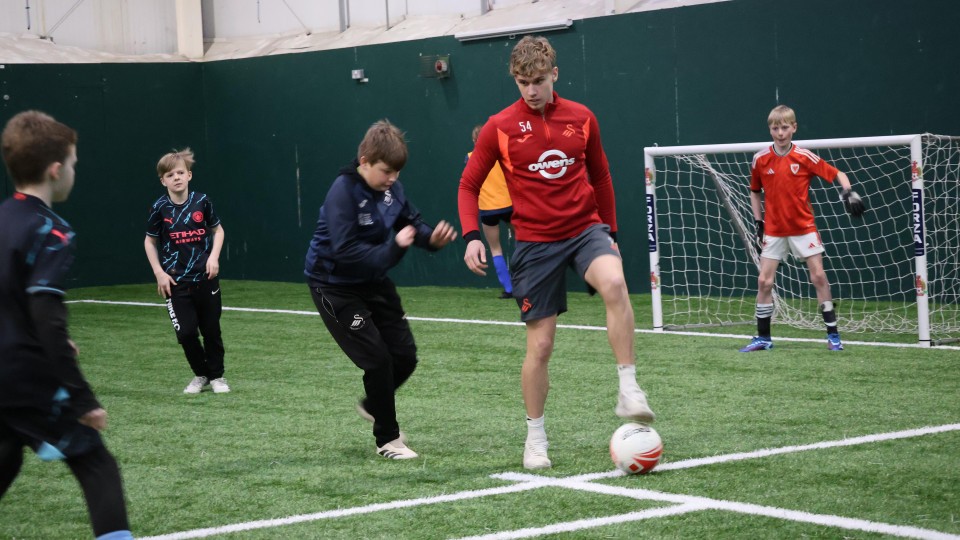EFL Youth Development Week | Academy Education and Life Skills

As part of EFL Youth Development Week, Jordan Morris, Jack Pritchard and Toby Rossiter - discuss the process and importance of player development off the pitch at Swansea City within the club's education and life skills program.
The education programme plays an integral part in the development of Swansea City's young players, and is of paramount importance.
The players also have the opportunity to complete BTECs alongside coaching certifications with Uefa.
The education programme is designed to accommodate full-time and part-time models in conjunction with the EFL and Professional Footballers' Association's League Football Education system.
Part-time students do most of their learning in the school environment, with any learning impacted by their football replaced at the academy through the school absence release programme.
The lower age groups also have the chance to take on extracurricular activities and learning after school alongside their parents, which includes sessions highlighting safeguarding, Equality, Diversity and Inclusion, and anti-bullying.
"With a new education team put in place in June 2023, the academy felt it was critical to design a syllabus whereby it could be used as a reference tool for not only players but also members of staff to gain clarity on what the department does," said Jack Pritchard, Swansea City academy's assistant head of education.
"We often see coaching methodologies and essentially looked to create our own template that is now visually accessible to all."
PART-TIME PLAYERS
"This covers all boys from the pre-academy to the under-16s. We hold weekly phase meetings as part of a wider multi-disciplinary team which allows us to track and inform school attainment, attendance and behaviour for the foundation phase and youth development phase," added Pritchard.
"School reports, which are gathered three times a year, are a great way of communicating this.
"We also have plans in place for school absence release if it was to occur in the future.
"Through our partnership with Swansea University, we have had five PGCE students on work experience that provides a cost-effective way of delivering Maths and English."
FULL-TIME PLAYERS
This covers all players from the Under-18s to the first team. The Under-18s have a wide range of qualifications available, including A-Levels, BTEC, Vocational Qualifications, the Uefa C Licence and a compulsory Maths/English resit for those in need of support.
For the Under-21s and first team, it very much depends on their availability and needs. For example, players at the end of their career may show an interest in a business qualification, whilst a recent signing may require additional English lessons.
The education department also have future plans to offer a foundation degree for those entering the early years of a professional contract.

When players join the full-time programme, there are two compulsory qualifications which they will earn by the end of their two-year scholarship delivered by a range of Uefa Pro license holders and personal trainers.
When players join the full-time programme, there are two compulsory qualifications which they will earn by the end of their two-year scholarship. These are delivered by a range of Uefa Pro Licence holders and personal trainers.
Morris highlights the importance of maintaining compulsory qualifications alongside football, which may be vital if a career in playing is not for them.
Fitness Instructor and Personal Trainer Qualification
"For scholars who are studying the BTEC sport, fitness, and personal trainer qualification. After year one, all scholars will achieve a fitness instructor qualification and - post completion of year two - they will be a qualified personal trainer," said Morris, the academy's head of education.
"The fitness instructor qualification enables scholars to work in a gym environment if they were to be unsuccessful in pursuing a career in football. Furthermore, the personal trainer qualification can allow them to work in a gym as a personal trainer, or if they wanted to progress starting their own business."
Uefa 'C' Licence
"The club work closely with the Professional Footballers' Association (PFA) to ensure each scholar has the chance to achieve the 'C' licence which will enhance their game understanding from a coach perspective," added Morris.
"It provides them a chance to gain work experience and deliver sessions to the younger age groups in a professional academy. Furthermore, it puts them on a coaching ladder and with more coaching experience they can then apply for higher coaching qualifications."
Relationship with External Stakeholders
Outside of the classroom at Landore, players also maintain their education off-site at Gower College and Bishop Vaughan Comprehensive.
"We work closely with Gower College, who deliver A-Levels to our scholars, it varies from construction to barbering," said Morris.
"The college has been outstanding in keep us updated and supporting the scholars, especially when fixtures have been rescheduled, which could have an impact on lessons.
"The education department deliver BTEC through Bishop Vaughan. Kate Mainwaring, who is our point of contact who regularly informs us of any updates that may occur or be required regarding the quality assurance of the qualification."

As a department, Pritchard feels it is important for players to have objectives they look to achieve and reflect on at the end of the academic year.
"Academy manager Gavin Levey set us the task of defining what 'Good', 'Winning' and 'High Performance' looks like to our department," said Pritchard.
"After completion, we then thought what a brilliant opportunity we had to present this to the players and ask them to measure what culture and environment they thought they worked within, individually and collectively.
"Nine months into this new project, we are still searching and striving for 'high performance', and our winning culture may at times only be measured at the end of a season, but what these definitions have allowed is for us to hold everyone accountable, staff and players."
IN THE COMMUNITY
Additionally, over the past two seasons, the scholars have been working closely alongside the Swansea City AFC Foundation to ensure players reach out and connect with the local community.
Recently, scholars have engaged in school tournaments and football sessions which has enabled them to join in and inspire the next generation, as well as being able to give something back to the community which enables them to experience what is expected, if of when they go on to sign a professional deal.
The under-18s have taken part in the Foundation's soccer camps in Llandarcy, plus appearing at World Book Day events and Stadium Tours.
LIFE SKILLS

League Football Education's (LFE) responsibilities extend to the delivery of life skills to under-nine and under-21 players, parents and club staff.
LFE’s Life Skills programme covers topics that include emotional wellbeing, equality, diversity and inclusion, finance, cardiac and sexual health awareness, social media, talent transfer, resilience, personal development and lifestyle and education on key subjects such as gambling, alcohol and drugs.
But it’s not just players and staff who benefit from these sessions, parents of players also have the opportunity to get involved.
The academy recently welcomed Gordon MacLelland from Working with Parents in Sport to deliver a day of workshops providing unbiased information that understands the difficulties that organisations, parents, coaches and athletes face in today’s world, most specifically from a parents' point of view.

Early February saw former footballer Paul Stewart come to SA1 to speak to the under-18s and staff about safeguarding awareness in sport, whilst the Professional Footballers' Association (PFA) recently visited to speak about careers beyond football, and their newly-formed business school for young players.
Head of player care Toby Rossiter believes the delivery of the life skills programme alongside their educational pathway is vital for the personal development of players in the club's academy.
"We firmly believe our academy footballers should be given the chance to follow an educational pathway that inspires and motivates them, whilst also giving them the freedom to realise their academic potential," said Rossiter.
"Life skills offers a different way of teaching, where we focus on skills such as financial stability, nutrition, mental health and EDI.
"Our Life Skills programme provides all academy players with an opportunity to learn about key topics that will support their holistic development.
"Bringing in industry professionals gives the boys someone to look up to and listen to, and they're brilliant when we bring guests it. They're a huge credit to the club."
